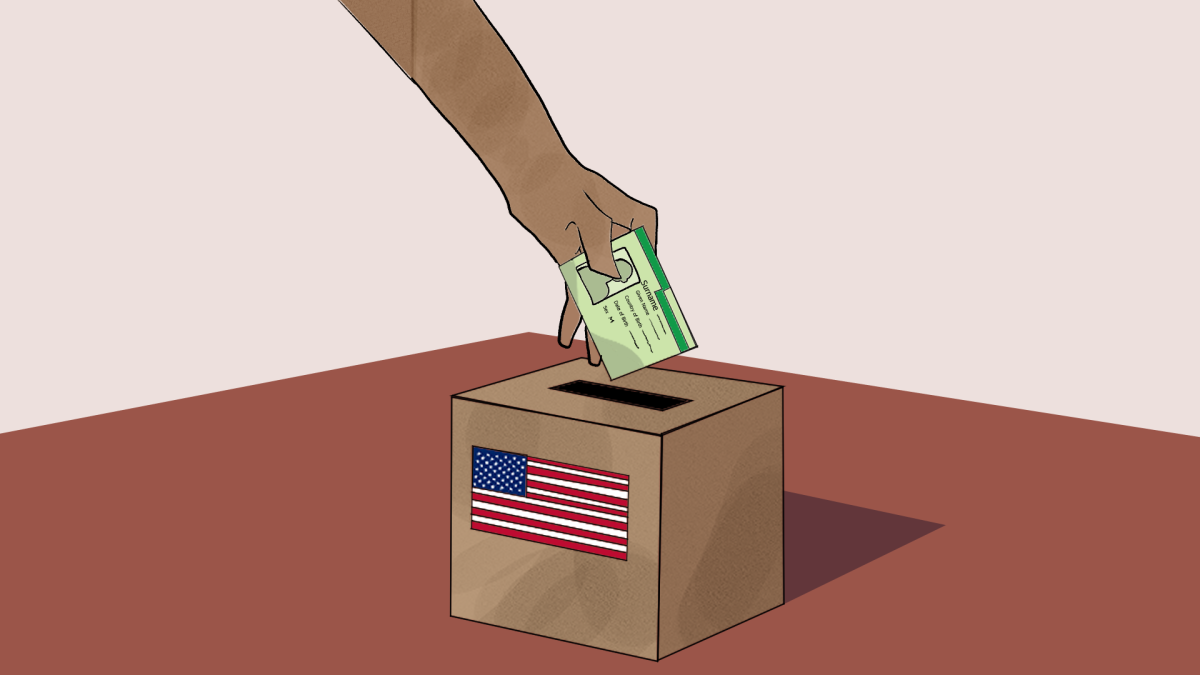Every four years, many North Carolinians take to the polls to vote for their preferred candidates and policies, yet permanent residents and naturalized citizens alike have found barriers to political participation.
Shatha Boaj, a third-year studying political science, said she experienced financial and time constraints on her path to citizenship and ability to vote.
“I was only able to take the citizenship test when I was 18, and that’s when I jumped right into college,” Boaj said. “With that, there isn’t really much of a chance to pay almost $1,000 just for the application and go through an entire long application process.”
Citizenship application processing currently takes around 15 and a half months.
Boaj said election periods can be stressful for non-citizen residents in the United States, as policy reform can change their residency status or eligibility for permanent residency or citizenship.
“If you don’t really have citizenship, and with elections changing every couple of years and policy reform changing, you don’t know what’s going to happen to your immigration status,” Boaj said. “I think it is a fear for a lot of people, and they don’t have the privilege to just just go on about the day.”
Valeria Vizcaino, a refugee community organizer for Church World Service Durham, said naturalized citizens’ backgrounds can influence their trust in the political process and voting.
“Refugees come from a specific background; it’s anyone fleeing persecution, violence or war from their home country,” Vizcaino said. “So a lot of the times, and it’s not just exclusive to refugees, but a lot of times, immigrants come from countries where they have been persecuted for their beliefs, or where it may not feel safe or private to vote, so they may not feel like they can vote, even if they’re naturalized here they may fear the process.”
Jasmina Nogo, an immigration attorney at the North Carolina Justice Center, said bills regarding immigration reform have led to different kinds of political involvement from immigrant communities.
Nogo mentioned community engagement regarding House Bill 10, which would require local law enforcement to determine detained persons’ citizenship status.
“It’s a bill that has brought a lot of people to show up en masse with their communities, regardless of status, and demand this bill does not become law in the state of North Carolina,” Nogo said.
Boaj said community activism allowed her to express her political opinions before achieving citizenship both on and off campus, but said she’s worried about the implications of grassroots political involvement.
“I’ve been really passionate about advocacy and activism,” Boaj said. “But the problem is, people can go to protest and get arrested, which isn’t the best thing, but nothing would happen to them. I wasn’t so keen on that because I don’t know what could have happened if I got arrested. I would have to include that on my naturalization application.”
With North Carolina now requiring photo identification at the polls, Nogo said there has been added confusion regarding eligibility for naturalized citizens.
“We saw in the primaries in the spring that there was confusion about whether or not IDs were required,” Nogo said. “Then there was also confusion around if someone doesn’t have an ID, if they’re still eligible to vote.”
As receiving a valid photo ID can be a lengthy process, Vizcaino said the new requirement is a suppressive tactic against voters.
“It affects immigrant communities because it can often make them fearful of getting out to vote,” Vizcaino said. “There is also not enough information being given to immigrant communities in their languages letting them know, ‘Hey, the voter ID laws have changed.’”
As driver’s licenses are the main form of photo identification in NC, a primary challenge voiced by community members was access to driver’s education materials in different languages.
“We have been able to work on a bill, HB 1013, this session to introduce French, Swahili, Pashto and Dari into the North Carolina and TMV language and written test because that is an issue that community members were voicing as a barrier,” Vizcaino said.
Nogo expressed further concern about a proposed amendment to remove the inclusion of the term “naturalized citizens” in the voter eligibility portion of North Carolina’s constitution.
“A lot of people aren’t certain about whether or the kind of qualifications for someone to register to vote have changed, which they have not,” Nogo said. “But all of the press around this has really confused a lot of people who are eligible to vote, and in our eyes, the new language is problematic, not because it changes the law because it doesn’t, but because it changes language in the state constitution that is inclusive.”
Nogo said these amendments stem from legislators’ fears of noncitizens voting in NC elections.
“The ballot initiative is built on false conspiracy theories that undocumented immigrants in the US are committing voter fraud and registering to vote and trying to steal elections,” Nogo said.
Boaj said immigrant community concerns, such as xenophobia, are often overlooked in election cycles for other issues.
“People kind of just forget that the people that are here, still, really even though they immigrated here and they’re living here, are still not welcome here in social means, or even in political means,” Boaj said.
Despite xenophobia, Boaj said her background has given her the motivation to become more involved in the political process, and that citizenship has given her the means to make a difference.
“It was a barrier, but it also empowered me just to want to go out and actually create change,” Boaj said. “To help those people that aren’t as fortunate as me to take the interview.”








